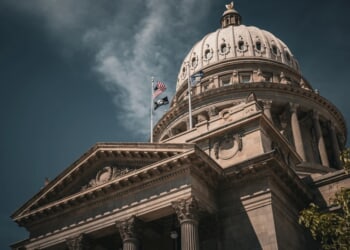Luke Robert Black MBE is the Chairman of the LGBT+ Conservatives, former approved Conservative Party candidate and founder of the Tory youth organisation Blue Beyond.
Have you ever had a kebab at 2am after a few too many pints? Embarrassed yourself on the dancefloor? Spent the evening chatting to complete strangers in the smoking area until 4 in the morning? Cherish these moments of fun now, because they may be consigned to history – at least in Soho.
Yes, sadly, Westminster Council seem to be copying the wider trend in anti-nightlife measures in places like Hackney where Labour won’t let you open a new bar later than 11pm, or Wandsworth, where Labour has scrapped outdoor dining.
Announced last week, Westminster Labour’s ‘Westminster After Dark’ strategy for 2025-2040 joins a now long-established track record of Labour politicians making it as difficult as possible for hospitality, live music venues, bars, clubs and the wider nighttime economy.
Mocked and detested almost instantly online, ‘Westminster After Dark’ is a new glossy report of sixty-four pages that aims to put ahead a long-term plan for nightlife in the borough – and sets sights on what Labour clearly sees as a decade of control of this pivotal London council.
Very rarely do local government reports get this level of interest. Yet, given the electorate of Westminster gave the Labour Party a decisive victory in 2022, they are now the custodians of some of London’s – and indeed the United Kingdom – most famous districts. Deciding the fates of suffering venues and restaurants in the West End, Soho, Covent Garden, Mayfair and Chinatown.
A fate that is about to get a lot worse, not the least because almost all the areas I just listed will not be classed by Labour as LNEZ – the city’s ‘Vibrant Late-Night Entertainment Zones’, where Labour will “enhance Westminster’s cultural and economic vibrancy” and “ensure that only responsible late-night operators…are permitted to operate”.
So, Soho, Covent Garden, Mayfair, Seven Dials, Chinatown, Shaftesbury Avenue, Piccadilly Circus and yes, even Leicester Square, will not be classed as ‘Vibrant Late-Night Entertainment Zones’, or LNEZs. Places like Greek Street in Soho will be at risk from stricter licensing restrictions and decisions as Labour plans to “utilise [their] planning policy to direct evening and night-time activity away from residential areas”.
Areas famous for restaurants, bars, clubs, theatre, live music and the general romantic buzz of London are all falling well out of scope for areas where Labour thinks enjoying yourself should be encouraged, or at least tolerated.
Instead, the LNEZs proposed by Labour are all tiny. Carving out just a small 0.4 mile stretch of Oxford Street, 0.3 miles of the Strand, and a slither of Victoria Street, Labour wants to use its powers to condense nightlight activity on these three small strips of road.
All taking less than ten minutes to walk from one end to the next, they don’t even constitute more than 1.2 miles in total of the borough – and cover areas of ‘entertainment’, nightlife, and hospitality that will come as big news to anyone who has got off at Charing Cross Station.
Aside from going to the Pizza Hut on the Strand as a child and spending my pocket money in Oxford Street Topman in the early 2010s, I doubt many ConHome readers will recognise the Oxford Street as a famous hospitality, live music, or clubbing destination – but clearly Labour do. Or perhaps they already know this, and simply want to reduce the fun, buzz, and fast pace that makes London so attractive.
Alongside the thin gruel that is allowing nightlife to exist in Oxford Street, Labour will also be bringing in new mandated ‘Quiet Nights’ for the whole borough where live music venues, bars, clubs and restaurants will be required to use dimmer lighting, lower volumes and to refrain from using flashing lights. Galleries and museums will also be required to implement ‘quiet nights’, where Labour plans to force these private businesses to admit fewer paying customers to allow for what they consider “increased participation”.
These are to make places more ‘accessible’ and ‘positive’, with Labour conveniently giving Londoners a case study of what it deems a ‘Positive Night-time Destination’: the tourist trap known as Kingly Court. Home to a few overpriced restaurants and the worst bar I’ve ever been to (Cahoots), Labour is fine with you having fun here – so long as it’s concluded before midnight, as that’s when most of Kingly Court’s attractions are open until.
Labour also thinks that midnight is where all the fun should end anyway. As Labour helpfully charts out in the report a graphical view of a night out in a city home to ten million: starting at 6pm in the evening, getting busy by 9pm, and being ideally wrapped up no later than 23:59pm.
From 00:00 onwards, Labour considers this to be a “quiet” time of the evening and when venues should be closing. Under ‘3am – 6am’, Labour doesn’t even mention anything – even a late-night bite to eat. That drunken kebab just sounds a bit too fun.
The economic case against excessive rules and restrictions on businesses struggling to make profit will be self-evident to ConHome readers, especially when businesses are set to face a ‘triple whammy’ in Rachel Reeves’ budget, with a business rates relief removed, an anti-jobs NICS increase, and a minimum wage increase from April 2025.
But we should not neglect the deeper and more philosophical issue, more important than small government vs big government and Starmer’s promise to have a government that “treads more lightly” on the lives of Brits: it’s about having fun. Labour simply don’t want you to.
The Westminster After Dark strategy is filled with goals to promote outdoor exercise in the West End instead of clubbing, “wellness spots” instead of restaurants, and speaks about Soho, Covent Garden and Mayfair as if it is ashamed of them. Every reference in the report to the nighttime economy is qualified instantly by ‘balancing’ the demands of the “residents [need] to get a decent night’s sleep”.
Contrast this with how Boris Johnson spoke of London’s nightlife in his 2016 CAZ report: “there should be recognition that Covent Garden, Soho and the West End contain the country’s largest concentration of evening activities and is defined in the London Plan as a night time economy cluster of international importance”.
It’s part of a wider Labour ideology. Banning outdoor smoking areas, telling you how big your pint glass should be, and even banning pub banter. Of course, it’s all anti-growth and anti-business. But it’s also anti-fun – and having fun matters too.





![Trump's Admin Guts Another ‘Rogue Government Agency with Zero Accountability’ [WATCH]](https://www.right2024.com/wp-content/uploads/2025/03/Trumps-Admin-Guts-Another-‘Rogue-Government-Agency-with-Zero-Accountability-350x250.jpg)



![‘We All Owe Him (Elon) a Huge Debt of Gratitude’ [WATCH]](https://www.right2024.com/wp-content/uploads/2025/03/‘We-All-Owe-Him-Elon-a-Huge-Debt-of-Gratitude-350x250.jpg)

![NCAA Champ Salutes President Trump After ‘BIGGEST UPSET IN COLLEGE WRESTLING HISTORY’ [WATCH]](https://www.right2024.com/wp-content/uploads/2025/03/NCAA-Champ-Salutes-President-Trump-After-‘BIGGEST-UPSET-IN-COLLEGE-350x250.jpg)





